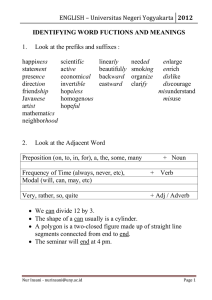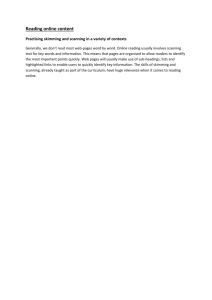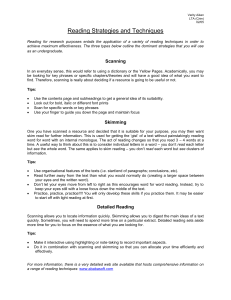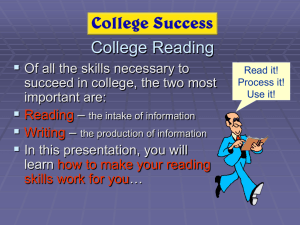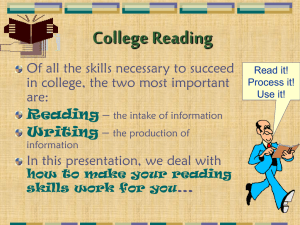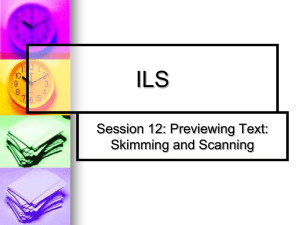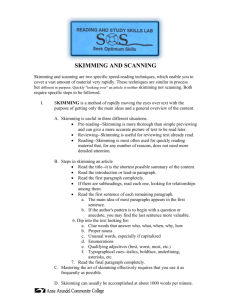SKIMMING 2012 English for Mathematics – Universitas Negeri Yogyakarta
advertisement
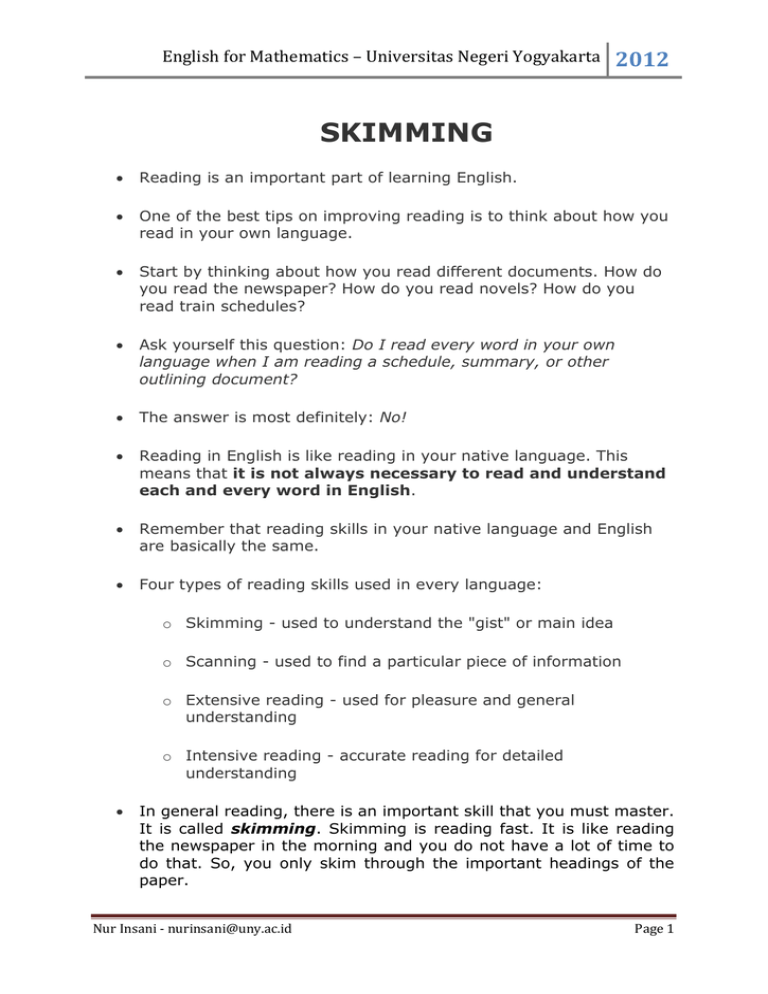
English for Mathematics – Universitas Negeri Yogyakarta 2012 SKIMMING Reading is an important part of learning English. One of the best tips on improving reading is to think about how you read in your own language. Start by thinking about how you read different documents. How do you read the newspaper? How do you read novels? How do you read train schedules? Ask yourself this question: Do I read every word in your own language when I am reading a schedule, summary, or other outlining document? The answer is most definitely: No! Reading in English is like reading in your native language. This means that it is not always necessary to read and understand each and every word in English. Remember that reading skills in your native language and English are basically the same. Four types of reading skills used in every language: o Skimming - used to understand the "gist" or main idea o Scanning - used to find a particular piece of information o Extensive reading - used for pleasure and general understanding o Intensive reading - accurate reading for detailed understanding In general reading, there is an important skill that you must master. It is called skimming. Skimming is reading fast. It is like reading the newspaper in the morning and you do not have a lot of time to do that. So, you only skim through the important headings of the paper. Nur Insani - nurinsani@uny.ac.id Page 1 English for Mathematics – Universitas Negeri Yogyakarta 2012 Skimming helps you to quickly identify the main ideas of a reading passage and create a brief overview of the information included in the reading passage. Rather than reading each and every word, skimming focuses your attention on nouns and verbs (who did what). It also helps you see the progression from one idea to the next as new nouns and verbs mix with old ones again and again. How can I improve my skimming technique? Follow this procedure for efficient skimming: Do a minimal preview of length, title, subtitle, publication information, visual aids, and difficulty level. As with any preview, this aids in comprehension and speed. Read selectively for main ideas. Key parts to focus on are usually a lead, first paragraph (usually the introduction), beginnings of key paragraphs, last paragraph (usually the conclusion). Time yourself and keep the correct mind-set. Vary your rate. Read key parts carefully and reread them if necessary; race past or through unimportant material. Focus on the nouns and verbs in the sentences. Move your eyes vertically across each line. Reading aloud when you encounter material you find difficult to understand, Highlighting for information you may want to review or find quickly later. Move your eyes in a wide spiral pattern. A very wide "S" curve is appropriate for most textbooks. Use the straight down pattern when skimming academic journal articles, magazines, newspapers, or other material formatted in columns. Use a soft focus. Relax your eye and facial muscles, look slightly above the line of print, and let your eyes float down the page. Try to read lines, not individual letters and words. Nur Insani - nurinsani@uny.ac.id Page 2 English for Mathematics – Universitas Negeri Yogyakarta 2012 HOW TO SKIM Usually the first paragraph will be read at rapid reading rate (about 300 - 400 wpm) all the way through. The first few paragraphs often contain an introduction or overview of the topic and the author's main idea(s). You should begin to grasp the author's style, mood, tone, and intent as well. Sometimes, however, the second paragraph contains the introduction or overview. In the first paragraph the author might just be "warming up" or saying something clever to "hook" the reader and motivate your interest. Approximately 87% of textbook authors will explicitly state their main idea in the first sentence of the paragraph (the topic sentence) --- --- --- --- --- --- --- --- --- ----- --- --- --- --- --- --- --- --- ----- --- --- --- --- --- --- --- --- ----- --- --- --- --- --- --- --- --- ----- --- --- --- --- --- --- --Reading a third or fourth paragraph completely might be unnecessary -- --- --- --- ----- --- --- --- --- --- --- --- --- ----- --- --- --- --- --- --- --- --- ----- --- --- --- --- --- --- --- --- ----- --- --- --- --- --- --- --- --- ----- --- --- --- --- --- --- --- --- ----- --- --- --- --- --- --- --- --- ----- --- --- --- --- --- --- --- --- ----- --- --- --- --- --- --- --- --- ----- --- --- --- --- --- --- --- --- ----- --- --- --- --- --- --- --- Nur Insani - nurinsani@uny.ac.id --- --- --- --- --- --- phrases --- ----- --- --- --- --- --- --- --- --- --- ----- --- numbers --- --- --- --- --- ----- --- --- --- --- --- --- --- --- --- ----- --- --- --- --- --- --- --- --- --- --- --- --- --- --- --- -- --- --- --- --- --- --- --- --- --- --- --- --- ---- --- --- --- skimming is work --- --- --- -- --- --- --- --- --- --- --- --- --- --- --- --- ----- --- --- --- --- --- --- --- --- --- --- --- --- -- --- --- --- --- --- --- --- This tells you nothing --- --- --- -- --- --- --- --- --- --- --- --- --Lowered comprehension is expected --- - --- --- --- --- --- --- --- --- --- --- --- --- ----- --- --- --- --- --- --- --- --- --- --- --- --- --- --- --- --- --- --- ---50% --- --- ----- --- --- --- --- --- --- --- --- --- --- --- --- --- --- --- --- --- --- --- --- --- --- --- Remember, sometimes the main - --- --- --- --- --- --- --- --- --- --- --- --- --idea is in the middle or at the end --- --- --- --- --- --- --- is not too low --- --of the paragraph. --- --- --- --- --- --- --- --- --- --- --- --- --- - --- --- --- --- --- --- --- --- --- --- --- --- --Some paragraphs merely repeat --- --- --- --- --ideas or give additional examples or illustrations --- --- --- --- --- --- Skimming practice makes it easier --- --- --- --- --- --- --- --- --- --- --- --- --- -- --- --- --- --- --- --- --- --- --- --- --- --- ---- --- --- --- --- --- --- --- --- --- --- --- --- --- --- --- --- --- --- --- --- --- --- --- --- --- --- --- --- --- --- --- --- --- --- - --- --- --- --- --- --- --- --- --- --- --- --- ----- --- --- --- --- --- --- --- --- --- --- --- --- - --- --- --- --- --- and will help you to gain Occasionally the main idea can't confidence that --- --- --- --- --- --- --- --- be found in the opening sentence. - --- --- --- --- --- --- --- --- --- --- --- --- ----- --- you are not missing the most Then you must read the whole important information --- --- --- --- --- --paragraph. -- --- --- --- --- --- --- --- --- --- --- --- --- ---- --- --- --When this happens, leave out a lot of the next paragraph --- --- -- --- --- --- --- --- --- --- --- --- --- - Perhaps you won't get anything at all from -- --- --- --- --- --- --- --- --- --- --- a few paragraphs --- --- --- --- --- --- --- ----- --- --- --- --- --- --- --- --- --- --- --- --- --- --- --- --- --- --- --- --- --- --- --- --- --- --- --- --- --- --- --- --- --- --- - --- --- --- --- --- --- --- --- --- --- --- --- ----- --- --- --- --- --- --- to make up --- --- --- --- --- --- --- --- --- --- --- --- --- time --- --- --- --- --- --- --- --- --- - --- --- --- --- --- --- --- --- --- --- --- --- ----- --- --- --- --- --- --- --- --- --- --- don't worry --- --- --- --- --- --- --- --- --- ---- --- --- --- --- --- --- --- --- --- --- --- --- --- --- --- --- --- --- --- --- ----- --- --- --- --- --- --- --- --- --- ----- --- --- --- --- --- --- --- --- --- --- Skimming has many uses --- --- --- --- ----- --- --- ---- --- --- --- --- --- --- --- --- --- --- --- --- ---- --- --- --- --- --- --- --- --- --- --- --- --- Remember to keep up a very fast - reports --- --- --- --- --- --- --- --- --- --- -rate --- --- --- --- --- --- --- --- --- - - --- --- --- --- --- --- --- --- --- --- --- --- ---- --- --- --- --- --- --- --- --- --- --- -- --- --- --- --- --- --- --- --- --- --- --- --- -Page 3 English for Mathematics – Universitas Negeri Yogyakarta Read the key sentences and let your eyes jump down through the paragraph --- --- --- --- --- -- --- --- --- --- --- --- --- --- ----- --- --- --- --- --- --- --- --- ----- --- --- --- --- --- --- --- --- ----- --- --- --- --- --- --- --- pick out major supporting details -- --- --- --- --- --- --- --- --- --- -- --- --- --- --- --- --- --- --- ----- --- --- --- --- --- --- --- --- ----- --- --- --- --- --- --- --- --- ----- --- --- --- --- names --- --- -- --- --- --- --- --- --- --- --- --- -- --- --- --- --- dates --- --- --- -- --- --- --- --- --- --- --- --- ----- --- important words --- --- -- --- --- --- --- --- --- --- --- ----- --- --- --- --- --- --- --- --- ----- --- --- --- --- --- --- --- --- --- --- --- --- --- --- ----- --- --- --- --- --- --- --- --- --- ----- --- --- --- 800 to 1,500 wpm ----- --- --- --- --- --- --- --- --- --- -- --- --- --- --- --- --- --- --- --- --- -- --- --- --- --- --- --- --- --- --- ----- --- --- --- --- --- 2012 --- newspapers --- --- --- --- --- --- --- --- -- --- --- --- --- --- --- --- --- --- --- --- --- ----- --- --- --- supplementary text --- --- ----- --- --- --- --- --- --The ending paragraphs might be read more fully as often they contain a summary. Don't be afraid to leave out half or more of each paragraph ---- --- Remember that the importance of --- --- --- --- --- --- --- --- --- --- --- skimming is to get only the author's main --- --- --- --- --- --- --- --- --- --- --- ideas at a very fast speed. --- --- --- --- --- --- --- --- --- --- ----- --- --- --- --- --- --- --- --- --- -- --- --- --- --- --- --- --- --- --- --- -- --- --- --- --- --- --- --- --- --- ----- --Don't get interested and start reading everything Why skim? Some advantages of skimming: Improves other reading rates - Learning to skim rapidly can help you improve your speed for study reading and average reading as well. Keeps you informed - Use skimming to building background knowledge. Skimming will help you keep informed in political affairs or other areas when you don't have the time to read very much. Speeds supplementary assignments - Skim supplementary material and you may be pleased and surprised to find how much information you will comprehend. Increases your sources of reference - Skim to build up your knowledge of reference materials. Skim journals or reports in your major field of study when you don't have the time to read them thoroughly. Knowing the article exists, the author, and perhaps its main idea can be important. Citing the main idea of the article in class or in discussion with your professor will make you seem very well informed. In addition, if you want to use the article later, you will know Nur Insani - nurinsani@uny.ac.id Page 4 English for Mathematics – Universitas Negeri Yogyakarta 2012 where to find it when you are ready for more detailed perusal. Brings useful material to your attention - People who have the habit of skimming a large amount of material will invariably come across certain articles or parts of books that are of great importance to them. These important parts can be read more carefully, but if you had never developed the habit of skimming, you might never have become aware of this important information. When is skimming helpful to college students? Use skimming as part of your regular textbook reading and studying. Before reading o Use skimming to preview - establish context, purpose, and content o Preview Skimming - Use preview skimming in textbook reading - Reading to Comprehend and Learn (PSQ5R) During reading - Use skimming to find o thesis, o main idea, o major supporting details, o organizational pattern, o overall style, o main characters, o plot outline. Skimming is also helpful: when you are sorting through possible sources for a research paper to see which ones will be helpful when you have a lot of reading to cover in a short amount of time (like when you need to read a passage and answer questions for a test) when you are making connections between graphs, charts, or diagrams, and the information in the text of the passage when you are looking for specific information (like names, dates, statements, events…) Nur Insani - nurinsani@uny.ac.id Page 5 English for Mathematics – Universitas Negeri Yogyakarta Nur Insani - nurinsani@uny.ac.id 2012 Page 6
